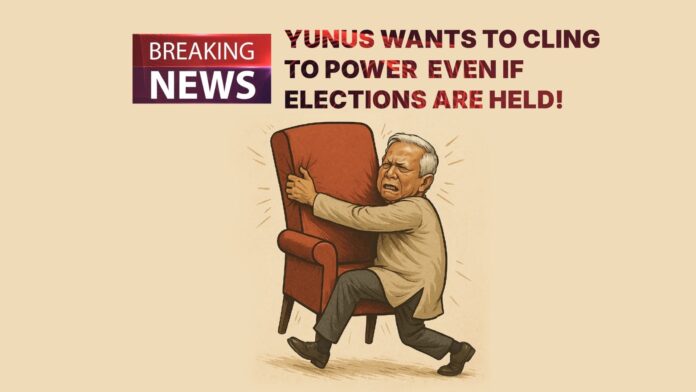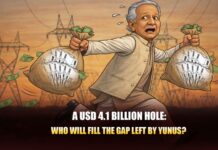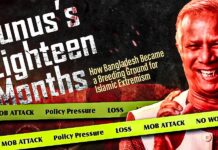Amid preparations for the upcoming national elections, a controversial and concerning plan has surfaced in Bangladesh’s political landscape. Reliable sources report that Interim Government Chief Adviser Dr. Muhammad Yunus intends to cling to power even if elections are held. A blueprint for this plan has reportedly already been drawn up.
According to sources, Yunus aims to secure control of 100 parliamentary seats through his close associates. One of his key allies is Lamia Morshed, Chief Coordinator of SDG Affairs at the Chief Adviser’s Office, who is said to be part of this strategy. Jamaat’s Secretary General, Professor Mia Golam Porwar, has hinted that Jamaat could leave aside 100 seats if an “alliance consensus” is reached. This makes clear that Jamaat too is willing to hand over 100 seats to Yunus.
What happens if 100 seats are set aside? Sources claim that the Yunus–Jamaat alliance plans to allocate another 100 seats to BNP. With Yunus himself retaining 100 seats, no party would be able to form a government without including his loyalists. In short, without his bloc, no government formation would be possible.
This plan is being described as fundamentally undemocratic. Such seat engineering under a Yunus-controlled administration is seen as a direct threat to Bangladesh’s political stability and democratic values. Without public participation and a transparent election, such schemes could push the country into further instability. To ensure fairness and legitimacy in the upcoming polls, a transparent and impartial process is essential. Otherwise, the foundation of democracy will only weaken further.
Rigged Elections and Observer Groups Under Scrutiny
The Election Commission (EC) has published a list of 73 election observer organizations, supposedly to ensure transparency, but this move has sparked major criticism. Investigations by Prothom Alo revealed that many of these organizations either lack physical offices or list private homes or abandoned buildings as their headquarters. Some are even run by politically linked individuals, directly violating EC’s own guidelines.
For example, the address of Kurigram’s “Agragati Social Development Organization” is listed simply as “Sindurmati, Rajarhat, Kurigram.” When visited, the executive director Humayun Kabir admitted the group currently has no activities. Similarly, the “Gorib Unnayan Sangstha” in Kurigram is essentially based in the home of its executive director Abdul Latif, staffed only by him and his son.
EC rules explicitly prohibit politically affiliated persons from leading observer groups. Yet investigations found five such organizations led by individuals with political backgrounds. For instance, Bashir Ahmed, founder of Dhaka’s “Sangati Social Welfare Organization,” is a former leader of the BNP’s student wing. In Jhalokathi, Moktar Hossain, Vice President of the “Hilful Fuzul Social Welfare Organization,” is tied to Islami Andolon Bangladesh.
Senior EC Secretary Akhtar Ahmed admitted that only a preliminary verification of addresses and political links was done. He said the list will be reviewed once public objections are submitted, with the deadline for complaints set until October 20.
Manipulation in Voter List Updates
The Election Commission’s ongoing voter roll update has also drawn heavy criticism. Although the EC claimed door-to-door data collection since January 20, residents in riverine char areas and remote villages reported no such activity. As a result, hundreds of thousands risk being excluded from the voter list.
One char resident complained, “We’ve been deprived of voting rights for years. No one came to collect our data this time either, yet the EC claims the process is done. This is outright deception!”
In its draft voter roll published in August, the EC listed 126.1 million registered voters, but countless names from remote and char regions were missing.
Mounting Concerns Ahead of the Elections
Serious concerns are rising over Bangladesh’s democratic and political future. Controlled government under the Yunus–Jamaat alliance, banning of political parties, flaws in the voter list, and media restrictions are collectively eroding the foundations of democracy. Without genuine public participation, the credibility of the elections remains in doubt.
The growing controversy and uncertainty surrounding the upcoming national polls is seen as a dangerous signal for Bangladesh’s democratic continuity. While Dr. Muhammad Yunus has long been a central figure in the interim government, allegations that he plans to “cling to power” and pursue a “blueprint for a controlled election” could push the country’s political process further into opacity and one-sidedness.





